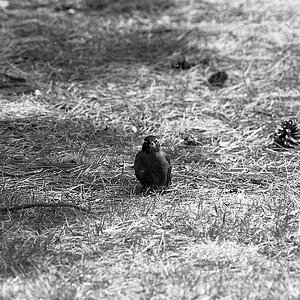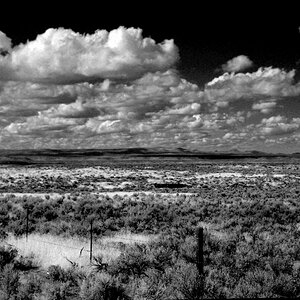Gaerek
No longer a newbie, moving up!
- Joined
- May 2, 2009
- Messages
- 1,341
- Reaction score
- 98
- Location
- Tucson, AZ
- Can others edit my Photos
- Photos NOT OK to edit
Let's just break it down, shall we?
That was the point I (and others) were making. It isn't needed. The times when it is useful is fairly few and far between. Would I take an IS lens over a non-IS lens? Most likely, yes, BUT that's because the IS lenses are typically higher quality, even among 'L' glass. Are there times I've used a non-IS lens and wished I had an IS lens? Sure. Was I able to get the shot anyway? Almost 100% of the time. Was that little bit of extra convenience worth the extra cost? For me? Not really, but then again, since this is just a hobby for me, I have a hard time justifying what I consider unneeded costs.
I disagree. Especially since the $600 IS IN FACT a part of the decision for the OP. Is it worth it? Only the OP can answer that. I'd imagine to a lot of people, especially newer photographer (such as the OP here) that $600 is a considerable amount of money to spend.
Since I've been writing my posts with the OP in mind, I made sure to make the point that $600 is a lot. But hey, since this has turned into an IS vs. non-IS debate, the OP's question means nothing anymore, amirite?
Oh, ok, I didn't realize they invented technology that breaks the laws of physics and allows you to stop movement within the frame even at really low shutter speeds. I know how IS works. Try photographing my 17 month old at 1/15sec with IS on and see how many shots turn out. That's what I meant by motion blur...not movement of the camera while holding.
Again, is IS useful? Yes, most definitely. I wouldn't call it a gimmick. You have to understand that I mostly agree with you. I just don't believe it's as useful as most people think. That's all.
Synopsis: IS isn't necessary, but virtually anyone with humility will at some point think "I wish I had a tripod or IS right now" and at that point you'll be glad to know you have it.
That was the point I (and others) were making. It isn't needed. The times when it is useful is fairly few and far between. Would I take an IS lens over a non-IS lens? Most likely, yes, BUT that's because the IS lenses are typically higher quality, even among 'L' glass. Are there times I've used a non-IS lens and wished I had an IS lens? Sure. Was I able to get the shot anyway? Almost 100% of the time. Was that little bit of extra convenience worth the extra cost? For me? Not really, but then again, since this is just a hobby for me, I have a hard time justifying what I consider unneeded costs.
Oh, and one last thing for Gaerek (I thin you were the one that said it)...in the world of lenses, $600 *is* "a little bit more".
I disagree. Especially since the $600 IS IN FACT a part of the decision for the OP. Is it worth it? Only the OP can answer that. I'd imagine to a lot of people, especially newer photographer (such as the OP here) that $600 is a considerable amount of money to spend.
Since I've been writing my posts with the OP in mind, I made sure to make the point that $600 is a lot. But hey, since this has turned into an IS vs. non-IS debate, the OP's question means nothing anymore, amirite?
Actually it will...all 3 of the IS 70-200s feature 2 types of IS. One is specifically designed for panning. It will allow you to pan without worrying about vertical movement.
Oh, ok, I didn't realize they invented technology that breaks the laws of physics and allows you to stop movement within the frame even at really low shutter speeds. I know how IS works. Try photographing my 17 month old at 1/15sec with IS on and see how many shots turn out. That's what I meant by motion blur...not movement of the camera while holding.
Again, is IS useful? Yes, most definitely. I wouldn't call it a gimmick. You have to understand that I mostly agree with you. I just don't believe it's as useful as most people think. That's all.



![[No title]](/data/xfmg/thumbnail/41/41756-e54235f9fba04c8380cd991845bb84b1.jpg?1619739881)
![[No title]](/data/xfmg/thumbnail/38/38736-5bc266b035e23faf5ad942bdd97466a8.jpg?1619738703)



![[No title]](/data/xfmg/thumbnail/41/41781-7dcfd2ee71d4a453b4ad9fb5c7e723f1.jpg?1619739890)


![[No title]](/data/xfmg/thumbnail/35/35664-428352d20c8015248f9625e246c3581c.jpg?1619737089)


